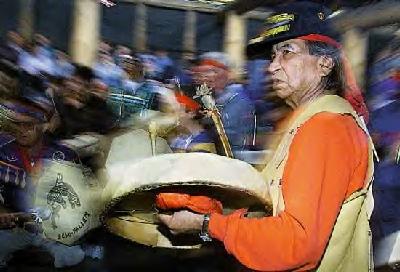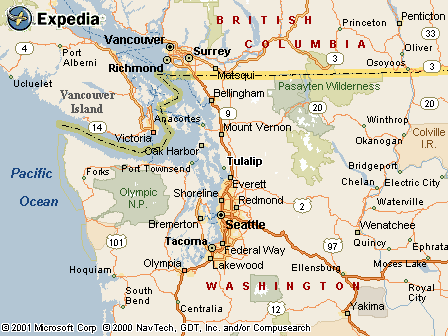|
|
Canku Ota |
|
|
(Many Paths) |
||
|
An Online Newsletter Celebrating Native America |
||
|
June 30, 2001 - Issue 39 |
||
|
|
||
|
The King of Welcomes |
||
|
By Karl Schweizer Herald Writer - June 17, 2001 |
 TULALIP -- More than 500 people came together in a fire-lit Tulalip Tribes longhouse Saturday to
dance, pray and wait for Big Chief King Salmon. TULALIP -- More than 500 people came together in a fire-lit Tulalip Tribes longhouse Saturday to
dance, pray and wait for Big Chief King Salmon. They weren't disappointed. Midway through the tribes' annual salmon ceremony, a young boy ran into the smoky building to proclaim the arrival of "Haik Ciaub Yo Bauch," the Big Chief himself. The crowd followed him to the beach, where fishermen in a canoe brought in Big Chief -- the first king salmon to be caught this fishing season. According to master of ceremonies Glen Gobin, the whole fishing season would depend on how Big Chief was treated. "The king comes to us from the Salmon People. He is a scout. He will go back to tell how he was received by the Tulalip," Gobin said. This fish got the royal treatment. From the boat, two men carried it ashore on a bed of ferns. A procession of dancers, drummers and the general public followed the Big Chief all the way to a large meeting hall, where he was deboned. Each person was treated to a small bite of salmon, symbolizing the first salmon of the season. At the end, the remains of the chief were put back into the water so he could go back to the Salmon People and tell them how respectfully he was received. "Hopefully, he'll send the rest of his people back here," Gobin said.  Lately, there haven't been enough Salmon People to go around, according to tribal leaders. Tribal chairman Herman Williams Jr. said he expects a two- to three-day fishing season this year, thanks in large part to the tribe's fish hatchery. That's up from previous years of one day or no days of salmon fishing, but not nearly enough to sustain the tribe's fishermen, he said. "Thirty to 40 percent of our fishing boats are harvesting shellfish. The rest are sitting in dry dock," Williams said. Williams used the ceremony to call for greater cooperation between the tribes and farmers, whose efforts to preserve salmon habitat help determine how much salmon is available for tribal fishermen to harvest. "For a long time we have been at odds. But the way things are going today, we should be allies," Williams said. To make the point, he invited beef farmer Dale Reiner to be a guest of honor at the event. Reiner has received national recognition for his efforts to protect salmon habitat on his 300-acre farm in Monroe by connecting 11 ponds along the Skykomish River, restoring salmon-rearing habitat. Reiner said he was pleased to be invited and lauded the Tulalips for including other groups in their salmon-restoration plans. "My farm and my beef end at the high-water line. The Tulalips raise salmon on the other side," Reiner said. "We (farmers) plan to be here a long time. The only way is if we work together with the tribes." |
|
|
|
Tulalip Natural Resources Programs |
|
|
||
|
|
||
| Canku Ota is a free Newsletter celebrating Native America, its traditions and accomplishments . We do not provide subscriber or visitor names to anyone. Some articles presented in Canku Ota may contain copyright material. We have received appropriate permissions for republishing any articles. Material appearing here is distributed without profit or monetary gain to those who have expressed an interest. This is in accordance with Title 17 U.S.C. section 107. | ||
|
Canku Ota is a copyright © 2000, 2001 of Vicki Lockard and Paul Barry. |
||
|
|
|
|
|
The "Canku Ota - A Newsletter Celebrating Native America" web site and its design is the |
||
|
Copyright © 1999, 2000, 2001 of Paul C. Barry. |
||
|
All Rights Reserved. |

